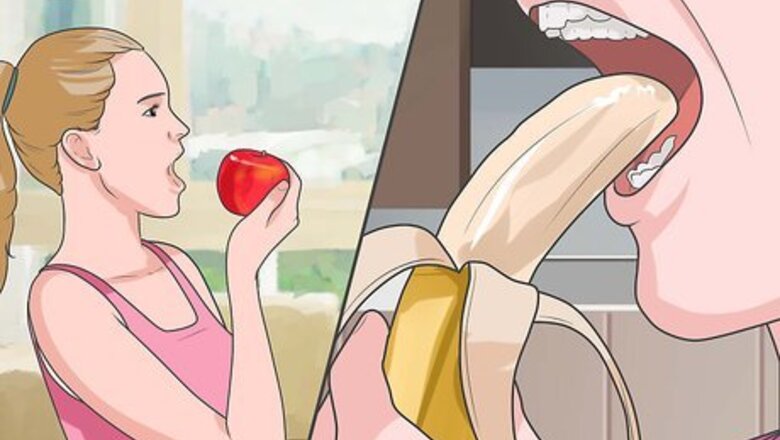
views
Getting the Right Minerals

Eat more magnesium. One of the best minerals for you if you are trying to get better sleep is magnesium. It is often a mineral that people are deficient in, so be sure that you try to get more of it every day. Magnesium deficiency can also cause calf cramps during the nighttime, which can disrupt sleep. Try to incorporate at least one food that is rich in magnesium every meal. These foods include: Fruits, such as berries, apples, melons, bananas, and avocado Vegetables, such as Swiss chard, kale, spinach, collard greens, turnip greens, mustard greens, beet greens, broccoli, various lettuces, and field greens Beans, such as soybeans and black beans Tofu Nuts and seeds, such as almonds, pumpkin seeds (pepitas), sesame seeds, sunflower seeds, and cashews Nut and seed butters, such as almond butter and sesame seed butter (tahini) Whole grains, such as cereals, breads, wheat, millet, oats, and brown rice
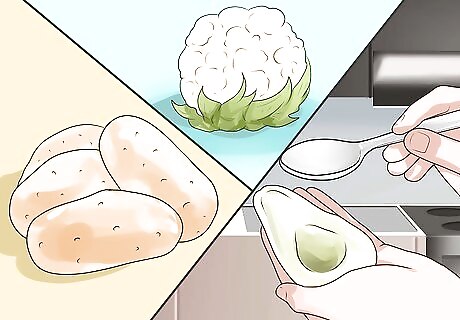
Get more potassium. Potassium levels are critical for you to achieve deep sleep. This means that you need enough potassium to get to sleep and stay in deep sleep, which will make you more rested. These foods include: Fruits, such as avocados and bananas Vegetables, such as mushrooms, tomatoes, collard greens, field greens, kale, Swiss chard, broccoli, lettuces, mustard greens, spinach, turnip greens, beet greens, potatoes, cauliflower, and sweet potatoes Beans, such as soybeans, lima beans, lentils, kidney beans, and pinto beans Fish, such as flounder, cod, or salmon
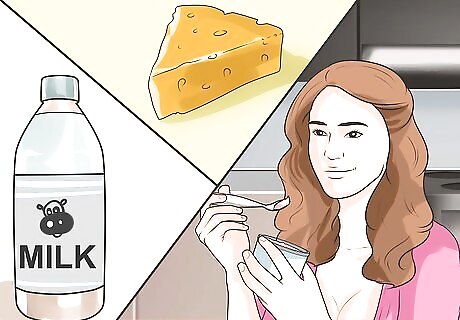
Increase your intake of calcium. Calcium, which has long been known to help bone health, is also needed to help your body get to sleep. It plays a role in necessary bodily functions that are needed to help you sleep. A calcium deficiency can cause a disturbance in REM sleep. Foods rich in calcium include: Vegetables, such as collard greens, spinach, mustard greens, kale, Swiss chard, turnip greens, broccoli, beet greens, lettuces, and field greens Dairy products, such as cheese, milk, and various yogurts Fish, such as salmon and sardines Nuts and seeds, such as almonds, Brazil nuts, and sesame seeds Soy products, such as tofu, soymilk, soy beans, and soy yogurt
Supporting Sleep Hormones
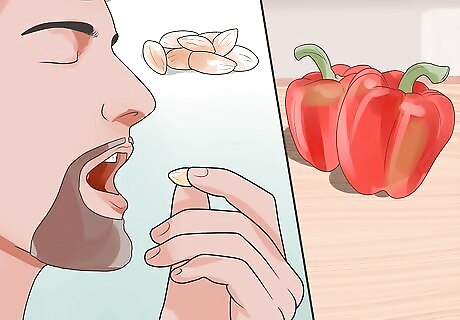
Increase melatonin production. Melatonin is one of the most important sleep hormones. It helps control your sleep cycle, which means the production of the hormone helps you get to sleep. Foods that help melatonin production include: Fruit and 100% fruit juices, such as cherries, raspberries, and goji berries Vegetables, such as tomatoes and orange bell peppers Seeds, such as mustard seeds and fenugreek Nuts, such as almonds
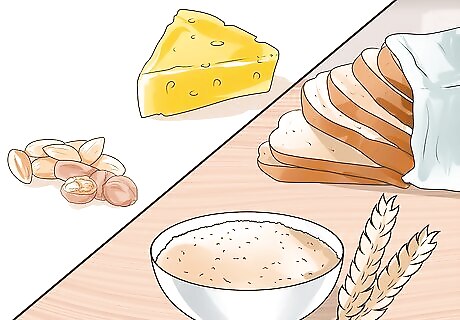
Help with serotonin production. Serotonin is a chemical messenger found in your body that plays a crucial role in sleep. Serotonin levels are low when you are asleep and high when you are awake, but a deficiency in serotonin can disrupt sleep. There are some foods that can help with its production. These include: Complex carbohydrates, such as whole grains and starchy vegetables Lean protein, such as chicken, salmon, and cheese Healthy fats, such as almond butters, various nuts, and seeds
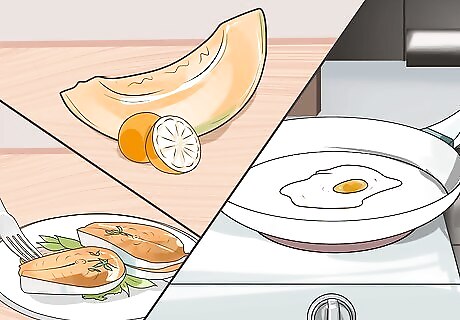
Eat foods high in B vitamins. All different forms of the B vitamins can help you sleep better. Vitamins B6, B12, and folic acid are B vitamins that support serotonin production in your body. Many foods rich in B vitamin also have other sleep-inducing minerals in them, which makes them especially helpful. Foods rich in B vitamins include: Vitamin-B6-rich foods, such as fortified cereals, poultry, beans, fish, dark leafy greens vegetables, oranges, papayas, and cantaloupe Vitamin-B12-rich foods, such as fish, assorted red meats, pork, poultry, dairy, eggs, fortified breakfast cereals, and enriched soy or rice milk Folate-rich foods, such as various fruits, many different vegetables, beans, whole and fortified grains, breakfast cereals, and grain products
Eating the Right Way
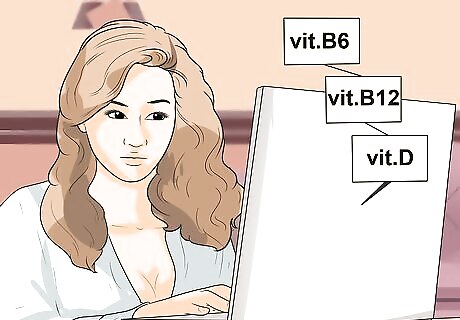
Identify the best nutrients for sleep. There are a number of vitamins, minerals, and other nutrients that can help you sleep better. The best nutrients for better sleep include magnesium, potassium, calcium, vitamin B6, vitamin B12, and vitamin D. These help various chemical messengers in your brain, which are starved for these nutrients, accomplish their functions related to sleep. These vitamins and minerals are also great for your overall health. This means that improving your sleep through food may also help improve your overall health. Avoid foods that are high in MSG since it may make it more difficult to fall asleep.
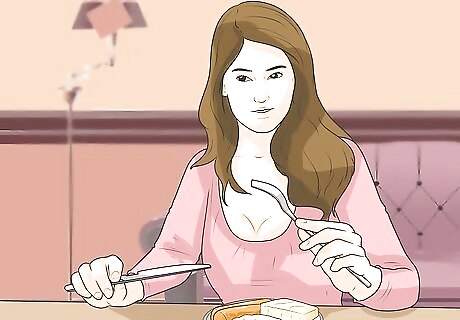
Get nutrients from food. The best way to get these nutrients is by eating foods rich in each of these nutrients every day. This means you need to watch what you eat and try to incorporate as much of these minerals as possible. You may also be able to increase these minerals with supplements, but your body will absorb the nutrients better if they come from food.
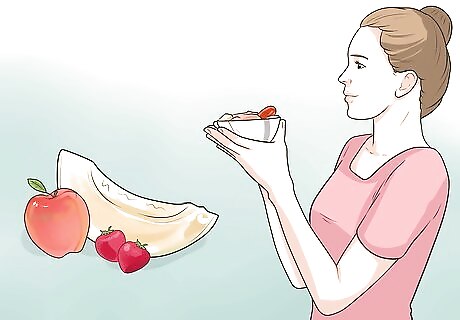
Eat them across multiple meals. When you are trying to get the right minerals and nutrients, you should spread them out. Eat healthy, nutrient-rich foods across multiple meals. This means you shouldn’t load all your nutritious food into one meal and then eat food devoid of nutrients at other times of the day. Try to get at least eight to 10 servings of these foods throughout the day. If you find this hard, start small. Add just one new type of food, such as a leafy green salad or a small cup of fruit, to each meal. This will help ease you into larger portions of these nutrient-rich foods throughout at day. As you get used to them, slowly replace other foods with these foods.
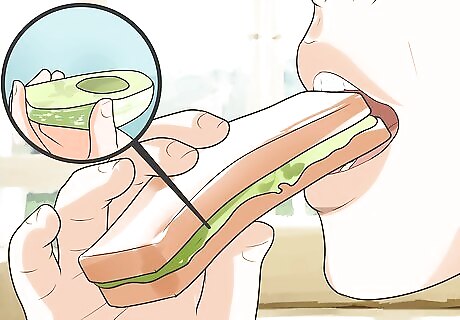
Choose foods that have multiple benefits. When you are eating for sleep health, try picking foods that have more than one of the helpful nutrients in them. This will allow you to get the most benefit from these foods each time you eat them. For example, avocados have magnesium and potassium in them, so eating them raw, in a sandwich, or on a salad may help you get better sleep by increasing two different sleep helping nutrients.
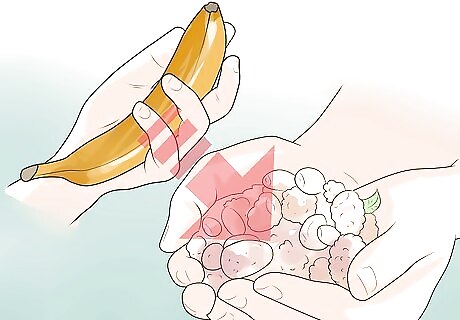
Try different things. If you are prone to getting bored with what you eat, try out different types of snacks rich in these vitamins and minerals. Don’t make it hard on yourself, either. If you know that you don’t like one thing rich in sleep-helping nutrients, change to another. It is better to find what you like than to keep yourself from any of the nutrients at all. For example, if you really hate bananas, which are strong in magnesium, switch them with a handful of berries or a serving of cashews instead. You can also incorporate them into recipes, such as making chicken stir-fry with cashews and broccoli or a large kale salad with almonds, salmon, and cherries.
Avoid eating large meals right before you go to bed. If you lay down right after you eat, you may suffer from indigestion or discomfort that can make it hard to fall asleep. Wait about 2–3 hours once you finish your meal before go to sleep so you get the best rest.
Limit the amount of alcohol and caffeine you consume in the evenings. Although you may feel drowsy when you drink, alcohol can be a stimulant and keep you awake as your body breaks it down. Caffeine is another stimulant that makes it difficult to fall asleep. If you can, cut alcohol and caffeine out of your diet in the evenings right before you go to bed so you don't feel as awake.
















Comments
0 comment